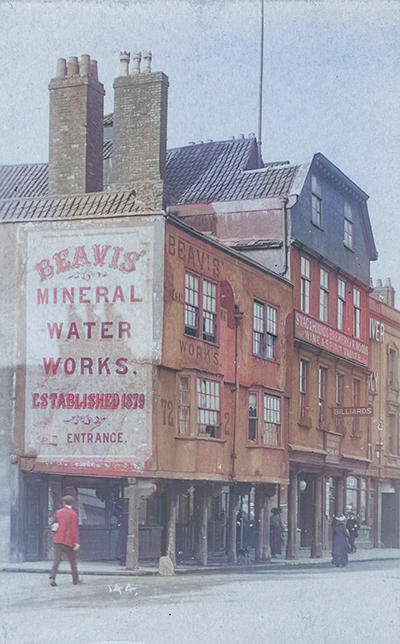

Charles Edward Beavis was born in St. Augustine, Bristol in the first quarter of 1848, baptised 23rd April, St. George's day, at St. Mary Redcliffe church, the son of George Beavis and Eliza Kingdon, who had married at St. John, Bedminster, on Christmas Eve 1837. His father George was a Dorsetshire born Shipping Agent from Fordington. It appears that Charles Edward was the fifth child of a large family. George later was a porter for the Steam Packet Company.
Charles married Mary Anna Attwell at St. Luke's, Bedminster, on 6th June 1870. At the time, he was an ironmonger's shopman, living at 45 Weare St. Bedminster. They had a son Albert Edward Beavis (b.1871, bapt. 27th Aug. at St. Luke) and daughter Lily Kate Beavis (b.1876, bapt. 25th June at St. Luke). Although the claimed establishment date of the aerated water manufactory is 1879, in the 1881 census Charles is listed as a Milk seller at Redcliff Cottage, Bryant Street, Redcliff. Mineral waters may have been an addition to this business, or he may have bought a previously established business. In late November 1877 property came up for sale in Langton Street, Cathay, including number 37, tenanted on a yearly basis by Robert Beavis, Charles's elder brother. Robert was a sail maker by trade, and in 1871 was also a publican, at the Princess Royal, 10 St. Luke's Road.
By August 1887 Charles is certainly a Mineral Water Manufacturer at Langton Street, Cathay, St. Mary Redcliff, with a 7 H.P. Roby portable engine for sale, quite a large steam engine on wheels. (Western Daily Press - Tuesday 23 August 1887 p.1.) In the Western Daily Press - Thursday 22 September 1887 p.3. it is reported that Mr. Beavis arranged an outing for his employees to Manchester! This outing became an annual occurrence and by 1890 Beavis had a Bath branch, managed by Mr. Bristow, which were picked up en-route to Weymouth, with dinner there provided at the Young Women's Christian Association. (Western Daily Press - Wednesday 01 October 1890 p.6.)
Lily Kate Beavis married
Frank Arthur Rogers, a Tailor's cutter, on 11th Sept. 1901 at St. Mary
Redcliffe. She died in 1954
Albert Edward Beavis married Sarah Ann Kate Harvey on
19th Sept. 1894 at St. Paul's, Bedminster. Albert carried on the
management of the Mineral Water business. Sarah and Albert had 4 children:
Lily Kate, Albert Edward, William Charles and Leonard Alfred. In 1911 they
were living at 279 Wells Road, Knowle.
Charles Edward Beavis
died on 28th Nov. 1930, he was living at "Arcadia", 254 Wells Road,
Knowle. He left his son the business and £32,000. From the Western
Daily Press - Monday 1st December 1930: "MR. CHARLES E. BEAVIS
PASSES - Long Life of Industry and Service in Bristol - The Passing of Mr.
Charles Edward Beavis, of "Arcadia," Knowle, removes a well-known figure
from the district. The deceased, who was in his 83rd year, had endeared
himself to a wide circle of friends, led a strenuous business life, and
was head of the well-known firm of mineral water manufacturers bearing his
name.
He was a director of the National Union of Mineral
Water Manufacturers, and was for many years on the executive of the
Bristol and West of England Mineral Water Manufacturers' Association. In
addition to making mineral water, he contributed to the city's industries
by the making of machines of which he was sole inventor and patentee, for
the mineral water trade. These machines were exported to all parts of the
world. He found time to identify himself with various social and religious
movements, and was largely responsible for the formation of the Bristol
St. John's Ambulance Brigade. The competition for the Beavis Cup was for
years a feature of ambulance displays.
He was honoured by the King of the Belgians with
the diploma and Palms in Gold of the Belgian Order of the Crown for his
work on the Knowle Belgian Refugees' Committee during the War. Mr.
Beavis's efforts to obtain a park for Knowle are well known, for he worked
assiduously for nearly 30 years, and lived to see signs of its ultimate
triumph.
The funeral takes place on Wednesday, December 3, a
service at Harrowdene Road U. M. Church, at 2.15 p.m., being followed by
the interment at Arnos Vale Cemetary."
Albert Edward himself died on 23rd August 1946 at his house at 279 Wells Road, in Knowle, leaving his Jacob Street business to his son Albert Edward, and effects of £52,000 between the same son and his daughter Lily Kate, who had by then married a William Henry Roberts. The Western Daily Press - Saturday 24 August 1946 - reported his death as follows: "The death is announced after a long illness of Mr. Albert Edward Beavis, at his home, 279, Wells Road, Knowle, Bristol. Mr. Beavis, who was 75 years of age, was head of the well known Bristol firm of Beavis Mineral Waters, of Jacob Street. He and his father, Mr. C. Beavis, had founded the firm, in 1879, on a site in Cathay, in Redcliff, and it had continued to expand until it had a world-wide trade in the export of mineral water machinery. He leaves three sons and a daughter. A memorial service will be held at Victoria Park Baptist Church on Tuesday at 11am, followed by the interement at Shirehampton." The mineral water business was still trading as late as 1963. The company's account book for 1901-1930 exists at Bristol Records Office, ref: 28575; NRA catalogue reference: NRA 7563 Bristol RO misc.
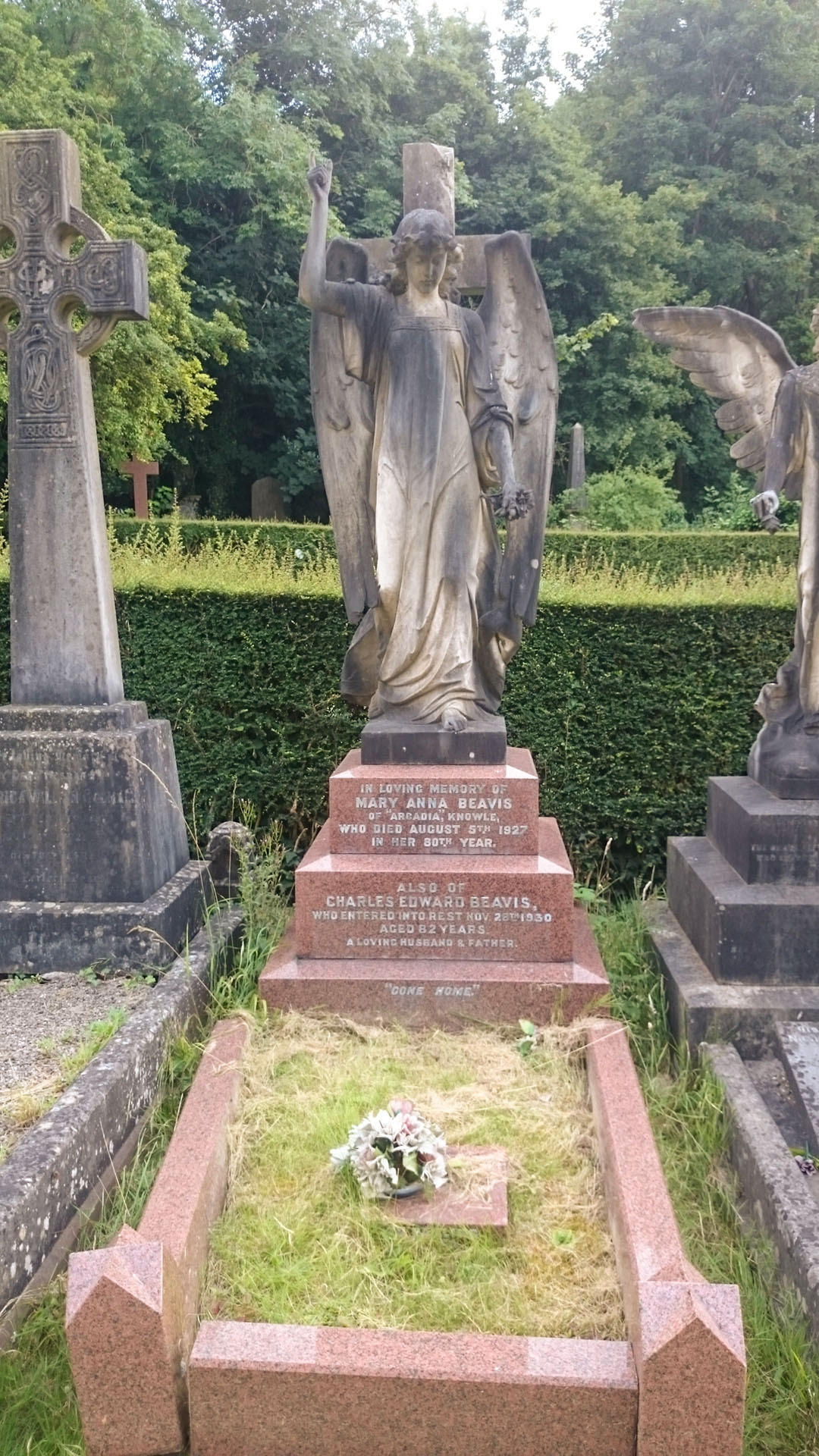 |
Beavis's tomb at Arnos Vale (click image to enlarge text).
| 2 Gallon Stone Tap Jar | 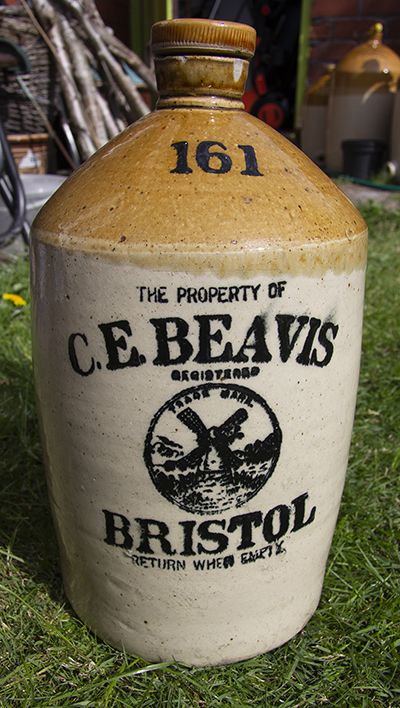 |
| Printed: 161 / THE
PROPERTY OF / C. E. BEAVIS (Windmill registered trade mark) BRISTOL
/ RETURN WHEN EMPTY. Potter: Price / Cx / Bristol. |
| 2 Gallon Stone Jar-(metal handle) |  |
| Printed: THE PROPERTY
OF / C. E. BEAVIS (Windmill registered trade mark) BRISTOL / TO BE
RETURNED WHEN EMPTY. Potter: Price / 16 / Bristol. |
| Stone Ginger Beer Bottle |  |
| Printed: C. E. BEAVIS
/ (Windmill registered trade mark) / JACOB STREET / BRISTOL. Internal screw stopper. Honey glaze. Potter: Price Powell & Co / 10 / Bristol. |
| Stone Ginger Beer Bottle |  |
| Printed:
C. E. BEAVIS / (Windmill registered trade mark) / JACOB STREET /
BRISTOL. Crown cap stopper. Honey glaze. Potter: Price / 15 / Bristol. |
| Brown Glass Ginger Beer Bottle | 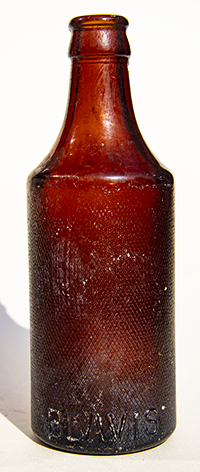 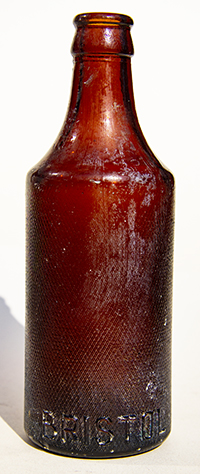 |
| Embossed
(around base): BEAVIS / BRISTOL. Crown cap stopper. Knurled body. Fully machine made. Glassworks: C. T. C. (Q1649/1) |
| 10oz Codd's Bottle |   |
| Embossed: Front: C. E.
BEAVIS (Windmill registered trade mark) BRISTOL Rear: BEAVIS / SHAPE Manufacturers: South Wales Glass Co. Ltd. / Makers / Newport Mon. |
| 10oz Codd's Bottles |  |
| Embossed: C. E. BEAVIS
(Windmill registered trade mark) BRISTOL (different windmill styles) Left and right neck groove. Manufacturers: Powell & Ricketts / Bristol |
| "Jumbo" Codd's Bottle |  |
| Embossed: C. E. BEAVIS
(Windmill registered trade mark) BRISTOL Manufacturers: Powell / Bristol |
| Split sized Codd's Bottle |  |
| Embossed: C. E. BEAVIS
(Windmill registered trade mark) BRISTOL Manufacturers: Powell & Ricketts / Bristol |
| Half Pint Beer Bottle |  |
| Embossed: C. E. BEAVIS
(Windmill registered trade mark) BRISTOL Internal screw stopper. Manufacturers: Powell & Ricketts / Bristol |
| 10oz Bullet Stopper |  |
| Embossed: C. E. BEAVIS
(Windmill registered trade mark) BRISTOL Manufacturers: Powell & Ricketts / Bristol |
| 10oz Bullet Stopper |  |
| Embossed: C. E. BEAVIS
(Horse Head registered trade mark) BRISTOL No Manufacturers Mark: CB on base. |
| Soda Syphon |  |
| Etched:
C. E. BEAVIS (Windmill trade mark) BRISTOL Manufacturers: British Syphon Co. Ltd. / London |
A GLASS BOTTLE PATENT - The Western Daily Press - Friday Dec. 8th, 1899 p.7.
The case of Beavis v. The Rylands Glass and Engineering Company, Limited, was heard yesterday before Mr. Justice Farwell, sitting in the Chancery Division of the High Court. Mr. Bousfield Q.C. and Mr. Badcock Q.C., instructed by Messrs E. J. Pillers, of Bristol, appeared for the plaintiffs, who carried on business at Bristol, and Mr. A. B. Shaw for the defendants, who were of Barnsley, Yorkshire.
Mr. Bousfield Q.C., said the plaintiff was the patentee and the registered legal owner of letters patent for improvements in mineral water bottles, and the defendant company had infringed the patent and had diverted custom from the plaintiffs and injured his business by representing that plaintiff's patent was invalid, and that bottles made according to that patent were substantially the same as those made by the defendant company. The action was for an injunction to restrain the manufacturing and selling of such bottles, and for damages. The defendants denied that they had infringed the patent, and alleged that the plaintiff's patent was not new when patented. The patent consisted of an alteration in the neck where the marble ran, as in Codd's bottles, which prevented the "starring" of the bottle, and made it easier to clean. Under the old plan of Codd's bottles, the indentation in the neck along which the marble ran, was horizontal, and the result was that in transit the marble ran to and fro rapidly, and eventually broke the bottle. In the plaintiff's improvement the indentation was sloped and made angular, the result of which was that in transit the marble scarcely rolled and did not break the bottle, while a brush could be taken in and out easily. The result of the adoption of these bottles had been that 20 per cent of the breakages had been saved.
Mr. G. King, of York Street, Bristol, said he was a mineral water dealer, and used from 6,000 to 8,000 dozen per week in 1897. The breakages were a vital question in the business, and now that Beavis's bottles were adopted, a great many fewer bottles were broken. He had been in business for 11 years in Bristol, and used 20,000 dozen more than in 1897, but still the breakages was less. He got some bottles from Powell & Ricketts, of Bristol.
Mr. H. Dalglish, of Nottingham, said the loss in Beavis's bottles were much less in breakages than in others.
Mr. M. Ball, of Bristol, said he was a mineral water manufacturer, and kept about 300 gross of bottles. They found great advantages in using Beavis's bottles. There were advantages in breakage, cleaning and filling.
Mr. W. Russel, of Kincardine, said he saw Beavis's bottles in use in England, and he ordered a quantity of them, which were supplied by the defendants.
Mr. G. S. Clayton, a mineral water manufacturer, said he had been in business for 12 years, and had never seen a bottle like Beavis's before 1897.
Mr. A. B. Shaw, for the defense, said that Messrs Rylands were formerly Codd and Rylands, and held all Codd's patents till they expired. He then read various specifications of variations of Codd's patents, which he said clearly showed that there were anticipations of the patent taken out by the plaintiff.
Mr. H. S. Jones, patent agent, compared patents by the plaintiff with an anticipatory patent by J. Jones, and said to all intents and purposes they were similar. The witness was cross-examined at some length by Mr. Bousfield as to the details of the patents.
Mr. W. Brook, secretary and manager of the defendant company, said he had been in the employment of the defendants for 17 years. He remembered the making of the bottles for Mr. Russell, and expressed the opinion that there were many bottles made before plaintiff's patents were taken out of practically the same pattern. He did not see very much advantage in Beavis's pattern. It depended a good deal on whether the indentations were properly made whether the bottle worked well or not.
(From a separate report in the Sheffield & Rotherham Independent, Fri. Dec. 8th, 1899, comes the following anecdote regarding the testimony of Mr. Wilton Brook:"His Lordship having requested the witness to demonstrate his theories as to the cleaning of the bottles, witness pushed a brush into a Codd bottle, and finding the brush would not come out again, expressed his disappointment by the sudden and involuntary voicing of an expletive in common use outside law courts.")
The further hearing of the case was adjourned.
GLASS BOTTLE PATENT ACTION. The Western Daily Press, Saturday, Dec. 9th, 1899.
The case of Beavis, of Bristol, against the Rylands Glass and Engineering Co., of Barnsley, Yorkshire- an action for infringing the plaintiff's patent in connection with glass bottles for mineral water - was resumed yesterday morning, before Mr. Justice Farwell, in the Chancery Division of the High Court. Mr. Badcock, Q.C., and Mr. Bousfield, Q.C., appeared for the plaintiff, and Mr. Fletcher Moulton, Q.C., and Mr. A. B. Shaw for the defendants.
Mr. Wilton Brook, secretary and manager of the defendant company, in reply to Mr. Shaw, said it was generally held that the life of a glass bottle was about five years. He remembered his firm making a bottle many years ago with an indent the shape of a figure 5 1, the curve of the figure being the recess where the ball fell into. These bottles were sold to a partner, who exported them to France. Witness had seen the moulds, but could not find them now. At that time they had 200 moulds, whereas now they had more than 10,000. They destroyed the moulds now as soon as they became obsolete, at the rate of 200 per annum. The bottle produced was as near as possible like the one made years ago.
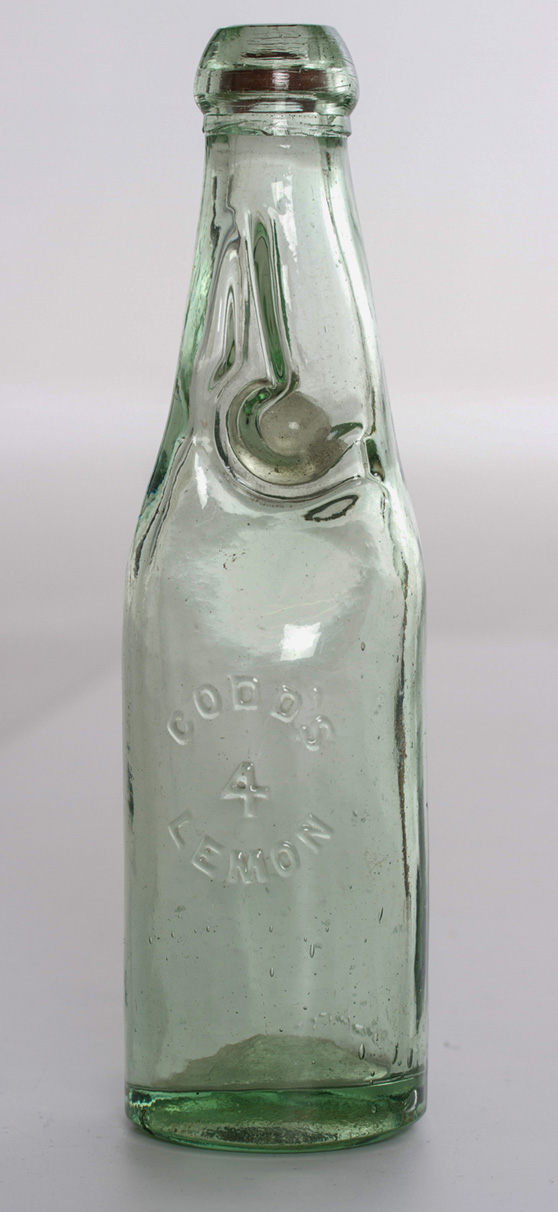
|
|
Codd's Patent 4 Lemon
Photo courtesy Alan Austin (AA Auctions)
|
By Mr. Bousfield: The bottles he was speaking of were made by his firm about 17 years ago. The bottle made varied a little from the specification, inasmuch as the horizontal indentation was curved, while the pattern was straight. He said his firm claimed to make the Beavis bottle, and in his opinion the variations were very small. He did not like the extra thickness on one side of the Beavis bottle, which he thought was a weakness.
Mr. J. H. Latham, who had been employed by the defendant's firm since 1877, expressed the opinion that the Beavis bottle was not a good one on account of the thinness of the metal at the base of the bottle.
Mr. Frank Hartridge, mineral water manufacturer, of Milton, said his firm had ordered 50 gross of Beavis's bottles, but had to refuse to receive half the consignment owing to breakage of a peculiar character. No doubt the quality of the bottle depended on the maker.
Mr. Jonah Nash, Gravesend, considered there were many bottles far superior to Beavis's.
Mr. A. T. Orders, employed by a Cambridge firm of mineral water makers, said his firm had used 25 gross of Beavis's bottles for the first time this summer. They were obtained from Lumm and Co. of Castleford. They preferred the Codd's bottles both for filling and cleaning.
This concluded the case for the defendants.
Mr. Fletcher Moulton addressed the court. He contended that neither utility nor shape alone had ever been held to make an invention. He knew no case where shape alone had ever been held to make an invention. In the case of the bottle in question, Beavis's shape was simply a variation of the indentation, and the mere change of the nick to the left or the right was not sufficient to make such a change something which was patentable. To make out a patent they must be able to show not only novelty and utility, but invention also. Mere variation of shape or form might not involve invention, and therefore might fail. He contended that Beavis's bottle was a mere ordinary variant of Jones's patent, with advantages and disadvantages.
Yesterday, before the Master of the Rolls and Lords Justices Rigby and Collins, the hearing was concluded of the appeal of the plaintiff in this patent action from the order of Mr. Justice Stirling of the 7th of November last, who decided against the patent in question on the grounds of want of subject matter and anticipation. the plaintiff is a mineral water manufacturer of Bristol, and the defendants, who carry on business at Barnsley, were alleged to have infringed his patent for improvements in the design of glass marble stoppered bottles for containing aetrated and mineral water. The merit claimed for the invention was that it strengthened the part where the indentations were made for preventing the marble from falling into the bottle, and thus reduced the percentage of breakages without interfering with the ceaning operations. The appeal was dismissed with costs.
After this action, the words BEAVIS'S PATENT on the backs of bottles were replaced with BEAVIS'S SHAPE.
Notes:
1). This bottle was known as the Codd's patent "Lemon", only one surviving example is known (see image).